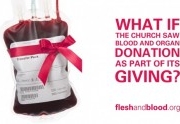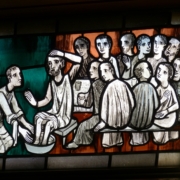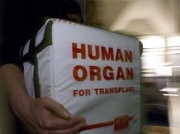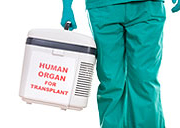Flesh and Blood – giving more than money
 A campaign to mobilise churches to increase the number of blood and organ donors in the UK has been launched this week. The aim is to build on the Christian culture of giving and make blood and organ donation part of this. In other words, to encourage blood and organ donation as another way of personal giving within churches.
A campaign to mobilise churches to increase the number of blood and organ donors in the UK has been launched this week. The aim is to build on the Christian culture of giving and make blood and organ donation part of this. In other words, to encourage blood and organ donation as another way of personal giving within churches.
The idea behind the new campaign, called FleshandBlood, is that various denominations, organisations and festivals will work with NHS Blood and Transplant (NHSBT) to raise awareness of, and encourage, blood and organ donation within the Christian community. The campaign will initially last for two years.
‘Being willing to give our time, money and gifts is a significant aspect of our stewardship of what we have received. But this applies just as much to the blood that flows in our veins; and the organs that are such an intrinsic part of our bodies.‘ (Bishop James Newcombe, Church of England Lead Bishop for Healthcare).
In 2011 there were 7,800 people on the UK waiting list for a transplant. There were 511 deaths of people on the waiting list but this figure may be higher, according to the BMA, perhaps 1,000 people.
A CMF paper by consultant transplant surgeon, Keith Rigg, encourages us all to consider what we would like to happen to our organs and tissues after death, and to tell family and friends. He is interviewed by FleshandBlood here too.
A CMF submission to a House of Lords Select Committee explains how organ donation fits within the Christian stewardship responsibility and call for sacrificial giving and love. The altruistic gift aspect of donation which arises from fully informed consent fulfills our Christian obligation to love our neighbour as ourself. Bishop James Newcombe also points out that it fits the mandate to heal, motivated by compassion and mercy for others. ‘The benefit to others is not only life enhancing but can mean the difference between life and death.’ Christians therefore support the principle of sacrificial generosity behind organ donation and transplantation.
Nevertheless, organ donation is not without controversies. Many will be aware of the current draft bill in Wales that is likely to introduce presumed consent. I have written several blogs covering some of our concerns with this (see here, here and here for example).
We should be aware of other agendas as well, such as possible conflicts of interest and debates over the definitions of death and controversies around ‘consent’. See, for example, this blog about some controversial proposals by the BMA to increase donation, including elective ventilation and ‘mandated’ consent.
Our support for organ donation is based on it being an altruistic free gift in a context of fully informed consent that is not undermined through any hint of financial incentives or elements of felt duty.
However this new campaign is based purely on altruistic donation. In addition to incorporating blood and organ donation into the ‘giving’ culture of the Christian Church, FleshandBlood will provide resources to equip individuals in the local church to explore donation with its members and wider community. To date, the Church of England, Methodist Church, Baptist Union, United Reformed Church, Salvation Army, Evangelical Alliance and HOPE have all signed up to the campaign.
The website www.fleshandblood.org provides plenty of information about blood and organ donation and allows people to register to become donors without having to leave the site. It also suggests practical ideas for churches and communities to engage with the campaign over the next couple of years.












Leave a Reply
Want to join the discussion?Feel free to contribute!